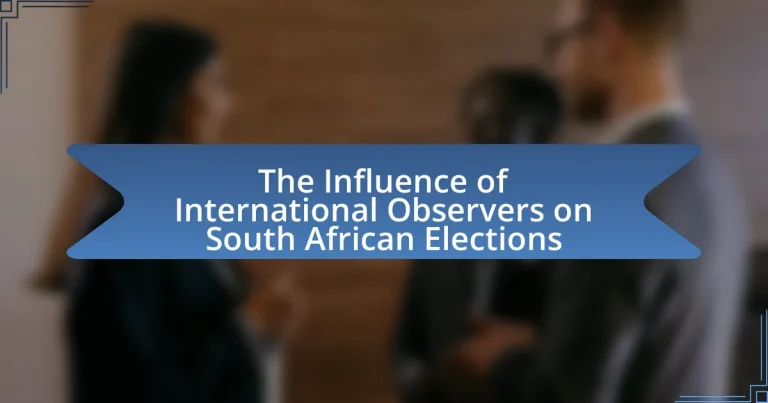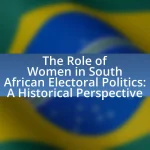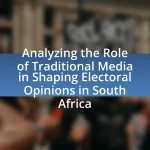The article examines the significant influence of international observers on South African elections, highlighting their role in enhancing transparency and credibility within the electoral process. It details how these observers, often from organizations like the African Union and the Commonwealth, monitor various aspects of elections, including voter registration, polling, and vote counting, thereby deterring electoral fraud and fostering public confidence. The article also addresses the selection process for observers, the challenges they face, and the impact of their assessments on electoral reforms and practices in South Africa. Additionally, it discusses best practices for improving the effectiveness of international observation missions and the lessons learned from past electoral experiences.
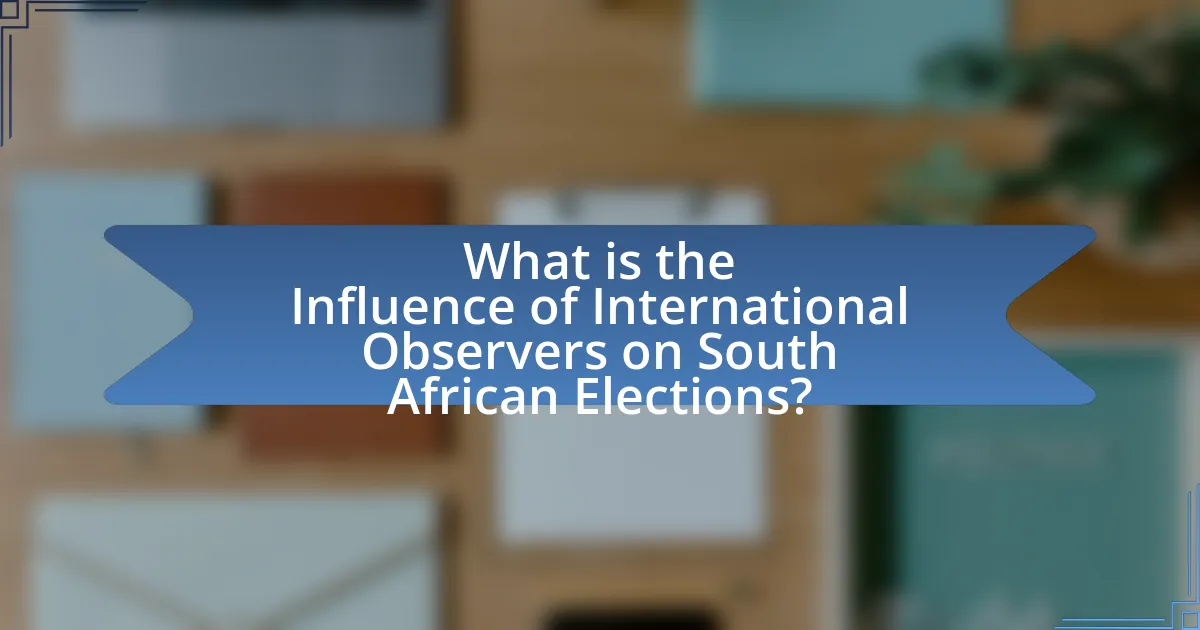
What is the Influence of International Observers on South African Elections?
International observers significantly influence South African elections by enhancing transparency and credibility. Their presence helps to deter electoral fraud and malpractice, as they monitor the electoral process, including voter registration, polling, and counting. For instance, during the 2019 national elections, the African Union and the Southern African Development Community deployed observers who reported positively on the conduct of the elections, thereby reinforcing public confidence in the electoral system. This oversight can lead to improved electoral practices and greater accountability among local electoral bodies.
How do international observers participate in South African elections?
International observers participate in South African elections by monitoring the electoral process to ensure transparency and fairness. These observers, often from organizations such as the African Union or the Commonwealth, are invited by the Electoral Commission of South Africa to assess various aspects of the elections, including voter registration, polling procedures, and the counting of votes. Their presence aims to enhance public confidence in the electoral process and provide an independent assessment of the elections’ integrity. Reports from these observers often highlight both strengths and areas for improvement, contributing to the overall credibility of the electoral system in South Africa.
What roles do international observers play during the electoral process?
International observers play critical roles during the electoral process by ensuring transparency, monitoring compliance with electoral laws, and assessing the overall fairness of elections. They observe the conduct of elections, including voter registration, polling procedures, and vote counting, to provide impartial assessments. For instance, the presence of international observers can deter potential electoral fraud and enhance public confidence in the electoral process, as evidenced by their involvement in South Africa’s first democratic elections in 1994, which helped legitimize the outcome. Their reports often highlight areas for improvement, contributing to the strengthening of democratic practices in future elections.
How are international observers selected for South African elections?
International observers for South African elections are selected through a formal invitation process initiated by the Electoral Commission of South Africa (IEC). The IEC invites various international organizations, such as the African Union, the Southern African Development Community, and other relevant bodies, to send observers. These organizations then choose their representatives based on criteria that include experience in election observation, knowledge of electoral processes, and impartiality. This selection process ensures that observers are qualified to assess the electoral process effectively and contribute to the transparency and credibility of the elections.
Why are international observers important for South African elections?
International observers are important for South African elections because they enhance the credibility and transparency of the electoral process. Their presence helps to ensure that elections are conducted fairly and in accordance with international standards, which can increase public confidence in the electoral outcomes. Historical evidence shows that international observers have played a crucial role in monitoring elections in South Africa since the end of apartheid in 1994, providing independent assessments that have often highlighted areas for improvement and helped to mitigate electoral fraud. For instance, during the 2019 national elections, observers from the African Union and the Southern African Development Community reported positively on the conduct of the elections while also noting specific challenges, thereby reinforcing the integrity of the electoral process.
What impact do international observers have on election credibility?
International observers significantly enhance election credibility by providing impartial assessments of the electoral process. Their presence deters potential fraud and misconduct, as the knowledge of scrutiny encourages adherence to democratic norms. For instance, during the 2019 South African elections, the presence of observers from the African Union and the Southern African Development Community helped ensure transparency and fostered public confidence in the electoral outcomes. Studies indicate that elections monitored by international observers are less likely to experience allegations of fraud, as their reports often highlight adherence to international standards and practices.
How do international observers contribute to voter confidence?
International observers enhance voter confidence by providing impartial assessments of the electoral process. Their presence signals transparency and accountability, which reassures voters that elections are conducted fairly. For instance, during the 2019 South African elections, the African Union and the Southern African Development Community deployed observers who reported on the integrity of the voting process, thereby bolstering public trust. Additionally, their evaluations often highlight areas for improvement, fostering a sense of ongoing democratic development and encouraging voter participation.
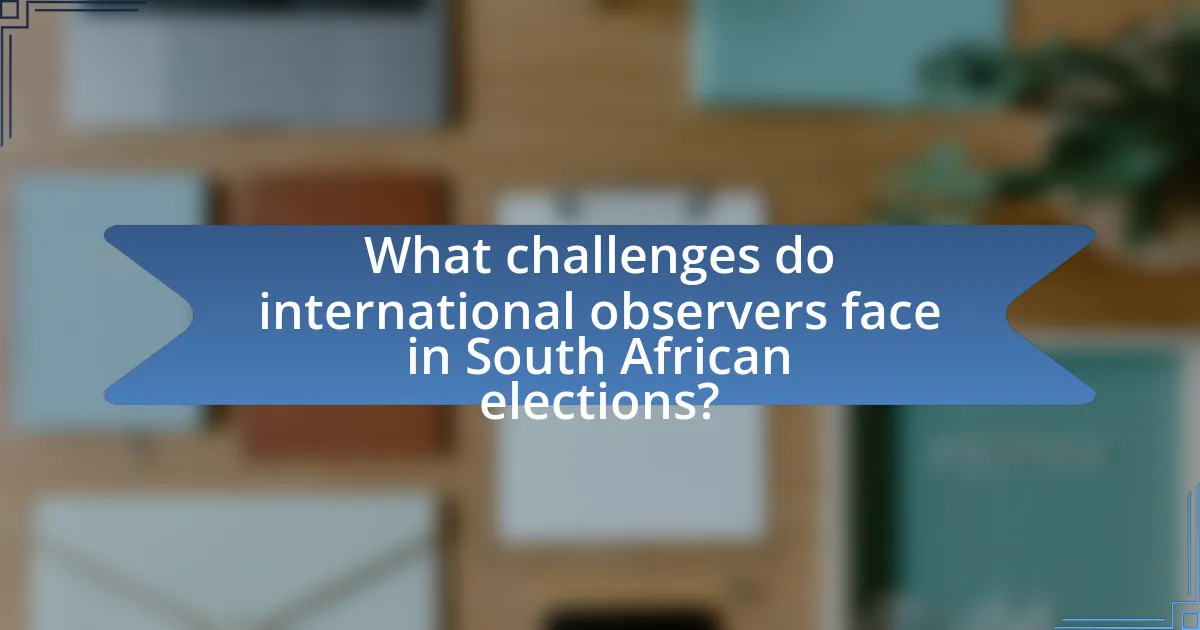
What challenges do international observers face in South African elections?
International observers in South African elections face challenges such as limited access to certain polling areas, political tensions, and logistical issues. Limited access can hinder observers’ ability to monitor the electoral process comprehensively, particularly in remote or conflict-prone regions. Political tensions may lead to hostility or resistance from local political actors, affecting the observers’ safety and effectiveness. Logistical issues, including transportation difficulties and communication barriers, can further complicate their operations, making it challenging to gather accurate data and report findings. These factors collectively impact the overall effectiveness of international observation missions in ensuring free and fair elections in South Africa.
How do political dynamics affect the work of international observers?
Political dynamics significantly influence the work of international observers by shaping their access, credibility, and effectiveness in monitoring electoral processes. For instance, in South Africa, the political environment can either facilitate or hinder observers’ ability to operate freely, as seen during the 2019 elections when observers faced restrictions in certain areas due to heightened tensions among political parties. Additionally, the perception of bias or favoritism among observers can arise from the prevailing political climate, impacting their legitimacy and the acceptance of their findings by local stakeholders. This relationship underscores the importance of a stable and transparent political context for the successful engagement of international observers in electoral monitoring.
What are the common criticisms faced by international observers?
International observers commonly face criticisms regarding their perceived bias, lack of understanding of local contexts, and insufficient engagement with local stakeholders. Critics argue that observers may favor certain political parties or candidates, undermining their neutrality. Additionally, observers often lack in-depth knowledge of the socio-political landscape, which can lead to misinterpretations of electoral processes. Furthermore, their limited interaction with local communities can result in a disconnect between their assessments and the realities on the ground, leading to questions about the validity of their conclusions. These criticisms highlight the complexities and challenges faced by international observers in effectively monitoring elections.
How do security concerns impact the effectiveness of international observers?
Security concerns significantly diminish the effectiveness of international observers by limiting their ability to operate freely and safely in conflict zones. When observers face threats such as violence or intimidation, their capacity to monitor electoral processes, gather accurate data, and report findings is severely compromised. For instance, during the 2019 South African elections, heightened security risks led to restricted access for some observer missions, which hindered their ability to assess the integrity of the electoral process effectively. This limitation can result in incomplete or biased reports, ultimately affecting the credibility of the election outcomes and the observers’ recommendations for future electoral reforms.
What measures can enhance the effectiveness of international observers?
To enhance the effectiveness of international observers, measures such as comprehensive training, clear mandates, and robust communication channels should be implemented. Comprehensive training equips observers with the necessary skills to assess electoral processes accurately, ensuring they understand local contexts and legal frameworks. Clear mandates define the scope of their responsibilities, allowing observers to focus on critical areas such as voter registration, polling procedures, and counting processes. Robust communication channels facilitate real-time reporting and collaboration with local authorities and other stakeholders, which is essential for addressing issues as they arise. These measures have been shown to improve the credibility and impact of international observation missions, as evidenced by successful interventions in various electoral contexts worldwide.
How can international observers improve their engagement with local communities?
International observers can improve their engagement with local communities by actively involving local leaders and organizations in the observation process. This approach fosters trust and enhances communication, as local leaders can provide valuable insights into community dynamics and concerns. For instance, the United Nations has emphasized the importance of local partnerships in electoral observation missions, which can lead to more effective monitoring and increased community participation. By prioritizing collaboration with local entities, international observers can ensure that their efforts are more relevant and responsive to the needs of the communities they aim to engage.
What best practices can be adopted by international observers in future elections?
International observers can adopt several best practices in future elections to enhance their effectiveness and credibility. First, they should ensure comprehensive training for observers, focusing on local electoral laws, cultural sensitivities, and the specific context of the elections being monitored. This training can improve the observers’ ability to identify irregularities and understand the electoral process, as evidenced by the success of organizations like the Carter Center, which has implemented extensive training programs in various countries.
Second, international observers should establish clear communication channels with local stakeholders, including electoral commissions, political parties, and civil society organizations. This practice fosters transparency and collaboration, as demonstrated in the 2019 South African elections, where effective communication helped address concerns about the electoral process.
Third, observers should utilize technology for real-time reporting and data collection, which can enhance the accuracy and timeliness of their findings. The use of mobile applications for reporting incidents, as seen in recent elections in various countries, allows for immediate documentation and response to electoral issues.
Lastly, international observers should publish detailed, impartial reports that include both positive aspects and areas for improvement in the electoral process. This approach not only provides accountability but also contributes to the overall integrity of future elections, as highlighted by the Organization for Security and Co-operation in Europe (OSCE), which emphasizes the importance of transparent reporting in its election observation missions.
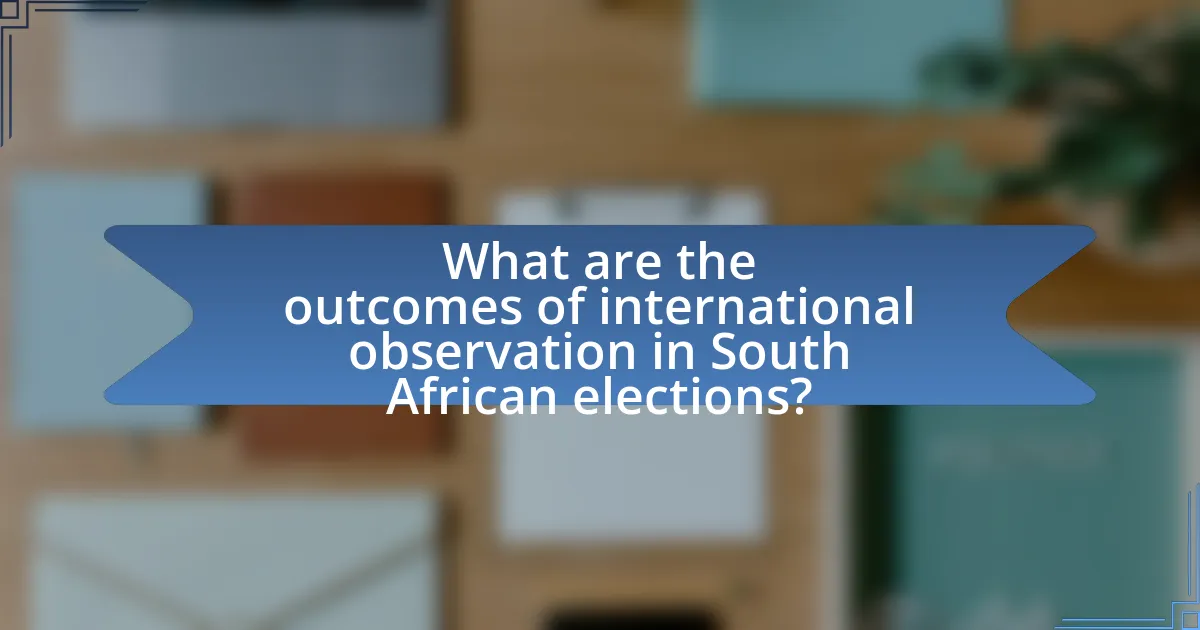
What are the outcomes of international observation in South African elections?
International observation in South African elections has led to increased transparency and credibility in the electoral process. The presence of international observers, such as those from the African Union and the Commonwealth, has helped to ensure that elections are conducted fairly and in accordance with democratic principles. For instance, during the 2019 national elections, the Electoral Commission of South Africa reported that international observers noted improvements in the electoral process compared to previous years, highlighting the effectiveness of these observations in fostering trust among voters. Additionally, the recommendations provided by international observers have often been implemented to enhance future electoral practices, further solidifying the role of international observation in promoting democratic governance in South Africa.
How do international observers influence electoral reforms in South Africa?
International observers influence electoral reforms in South Africa by providing independent assessments of the electoral process, which can lead to recommendations for improvements. Their presence enhances transparency and accountability, as they monitor compliance with international standards and local laws during elections. For instance, the African Union and the Commonwealth have deployed observer missions that have reported on issues such as voter registration, ballot security, and the conduct of political parties. These reports often highlight areas needing reform, prompting governmental and electoral bodies to implement changes aimed at improving the integrity of future elections.
What recommendations have been made by international observers in past elections?
International observers have made several recommendations in past elections to enhance electoral integrity and transparency. Key recommendations include improving voter education to ensure informed participation, strengthening the independence of electoral management bodies to prevent political interference, and enhancing the security of the electoral process to safeguard against fraud and violence. For instance, the African Union’s election observation missions have consistently emphasized the need for transparent vote counting and the establishment of clear protocols for addressing electoral disputes. These recommendations aim to foster public confidence in the electoral process and ensure that elections are conducted fairly and impartially.
How have past observations shaped the electoral landscape in South Africa?
Past observations have significantly shaped the electoral landscape in South Africa by enhancing transparency and credibility in the electoral process. International observers, such as those from the African Union and the Commonwealth, have historically monitored elections, providing assessments that influence public trust and international legitimacy. For instance, the 1994 elections, which marked the end of apartheid, were closely observed by various international bodies, leading to widespread acceptance of the results and the establishment of a democratic framework. These observations have prompted improvements in electoral laws and practices, ensuring adherence to democratic principles and fostering a culture of accountability.
What lessons can be learned from the role of international observers in South African elections?
The role of international observers in South African elections demonstrates the importance of transparency and credibility in the electoral process. International observers help ensure that elections are conducted fairly, which enhances public trust in the democratic process. For instance, during the 1994 elections, the presence of international observers from organizations like the United Nations and the Commonwealth provided critical oversight, contributing to the legitimacy of the electoral outcomes. Their reports highlighted the need for adherence to democratic norms and practices, reinforcing the idea that international scrutiny can deter electoral malpractice and promote accountability among local electoral bodies.
How can future elections benefit from the experiences of international observers?
Future elections can benefit from the experiences of international observers by implementing best practices identified during previous electoral processes. International observers provide critical assessments of electoral integrity, transparency, and fairness, which can guide improvements in electoral laws and procedures. For instance, the presence of international observers during South Africa’s 1994 elections helped establish benchmarks for democratic practices, leading to the adoption of measures that enhance voter education and reduce electoral fraud. Their reports often highlight areas needing reform, such as ballot security and voter registration processes, which can be addressed in future elections to ensure greater public confidence and participation.
What strategies can be implemented to ensure ongoing improvement in election monitoring?
To ensure ongoing improvement in election monitoring, implementing comprehensive training programs for election observers is essential. These programs should focus on enhancing the skills and knowledge of both local and international observers regarding electoral processes, legal frameworks, and best practices. Evidence from the 2019 South African elections indicates that well-trained observers can effectively identify irregularities and contribute to transparent electoral outcomes. Additionally, establishing robust communication channels between observers and electoral authorities can facilitate real-time reporting and resolution of issues, further strengthening the monitoring process.
What practical steps can be taken to engage with international observers effectively?
To engage with international observers effectively, South African electoral authorities should establish clear communication channels and provide comprehensive information about the electoral process. This includes sharing detailed guidelines on the roles and responsibilities of observers, as well as logistical arrangements for their participation. For instance, the Electoral Commission of South Africa (IEC) has previously facilitated observer engagement by issuing formal invitations and organizing briefing sessions to ensure that observers understand the electoral framework and procedures. Additionally, providing timely updates and access to relevant data during the election period enhances transparency and fosters trust, as evidenced by the positive feedback received from international observer missions in past elections.
